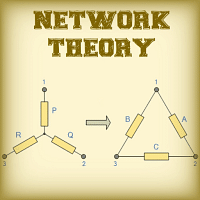Electrical Engineering (EE) Exam > Electrical Engineering (EE) Questions > Series capacitors on transmission lines are o...
Start Learning for Free
Series capacitors on transmission lines are of little use when
- a)the load VAR requirement is large
- b)the load VAR requirement is small
- c)the load VAR requirement is fluctuating
- d)none of the above
Correct answer is option 'D'. Can you explain this answer?
| FREE This question is part of | Download PDF Attempt this Test |
Most Upvoted Answer
Series capacitors on transmission lines are of little use whena)the lo...
Series capacitors on transmission lines are of little use when the load VAR requirement is large, small, or fluctuating. The correct answer is option 'D'.
Explanation:
Series capacitors are often used on transmission lines to improve the line's voltage profile and increase its power transfer capability. However, their effectiveness depends on the characteristics of the load and the power system.
1. Load VAR Requirement is Large:
When the load VAR requirement is large, it means that the load is consuming a significant amount of reactive power. In this case, the series capacitors may not be able to compensate for the reactive power demand of the load. Series capacitors provide capacitive reactive power, which is opposite in nature to the inductive reactive power consumed by the load. Therefore, if the load requires a large amount of reactive power, the series capacitors may not be sufficient to meet the load's VAR requirement.
2. Load VAR Requirement is Small:
On the other hand, when the load VAR requirement is small, it means that the load is consuming a relatively low amount of reactive power. In this case, the series capacitors may provide excessive capacitive reactive power, leading to overvoltage issues on the transmission line. Overvoltage can cause insulation breakdown, equipment damage, and system instability. Therefore, in situations where the load VAR requirement is small, series capacitors may not be necessary and can even be detrimental to the power system's stability.
3. Load VAR Requirement is Fluctuating:
If the load VAR requirement is fluctuating, it means that the reactive power demand of the load is constantly changing. Series capacitors have a fixed capacitive reactance and cannot adapt to the varying load conditions. They may be ineffective in compensating for the changing reactive power demand, leading to voltage fluctuations and instability in the power system. In such cases, other reactive power compensation techniques like shunt capacitors or static VAR compensators (SVCs) may be more suitable.
In summary, series capacitors on transmission lines are of little use when the load VAR requirement is large, small, or fluctuating. They may not be able to provide sufficient reactive power compensation or may cause overvoltage issues and system instability. Other reactive power compensation methods should be considered in such situations.
Explanation:
Series capacitors are often used on transmission lines to improve the line's voltage profile and increase its power transfer capability. However, their effectiveness depends on the characteristics of the load and the power system.
1. Load VAR Requirement is Large:
When the load VAR requirement is large, it means that the load is consuming a significant amount of reactive power. In this case, the series capacitors may not be able to compensate for the reactive power demand of the load. Series capacitors provide capacitive reactive power, which is opposite in nature to the inductive reactive power consumed by the load. Therefore, if the load requires a large amount of reactive power, the series capacitors may not be sufficient to meet the load's VAR requirement.
2. Load VAR Requirement is Small:
On the other hand, when the load VAR requirement is small, it means that the load is consuming a relatively low amount of reactive power. In this case, the series capacitors may provide excessive capacitive reactive power, leading to overvoltage issues on the transmission line. Overvoltage can cause insulation breakdown, equipment damage, and system instability. Therefore, in situations where the load VAR requirement is small, series capacitors may not be necessary and can even be detrimental to the power system's stability.
3. Load VAR Requirement is Fluctuating:
If the load VAR requirement is fluctuating, it means that the reactive power demand of the load is constantly changing. Series capacitors have a fixed capacitive reactance and cannot adapt to the varying load conditions. They may be ineffective in compensating for the changing reactive power demand, leading to voltage fluctuations and instability in the power system. In such cases, other reactive power compensation techniques like shunt capacitors or static VAR compensators (SVCs) may be more suitable.
In summary, series capacitors on transmission lines are of little use when the load VAR requirement is large, small, or fluctuating. They may not be able to provide sufficient reactive power compensation or may cause overvoltage issues and system instability. Other reactive power compensation methods should be considered in such situations.
Free Test
FREE
| Start Free Test |
Community Answer
Series capacitors on transmission lines are of little use whena)the lo...
Series capacitors on transmission lines are used to compensate for the inductive reactance of the line, thereby improving power transfer and voltage regulation. Their primary purpose is to provide reactive power support, which helps in reducing line losses and voltage drops.
The effectiveness of series capacitors is not dependent on the load VAR (volt-ampere reactive) requirement. Whether the load VAR requirement is large, small, or fluctuating, series capacitors can still be useful in improving power transfer and voltage regulation.
Therefore, the statement "Series capacitors on transmission lines are of little use when the load VAR requirement is small" is incorrect. The correct answer is D: none of the above.
Attention Electrical Engineering (EE) Students!
To make sure you are not studying endlessly, EduRev has designed Electrical Engineering (EE) study material, with Structured Courses, Videos, & Test Series. Plus get personalized analysis, doubt solving and improvement plans to achieve a great score in Electrical Engineering (EE).

|
Explore Courses for Electrical Engineering (EE) exam
|

|
Similar Electrical Engineering (EE) Doubts
Series capacitors on transmission lines are of little use whena)the load VAR requirement is largeb)the load VAR requirement is smallc)the load VAR requirement is fluctuatingd)none of the aboveCorrect answer is option 'D'. Can you explain this answer?
Question Description
Series capacitors on transmission lines are of little use whena)the load VAR requirement is largeb)the load VAR requirement is smallc)the load VAR requirement is fluctuatingd)none of the aboveCorrect answer is option 'D'. Can you explain this answer? for Electrical Engineering (EE) 2024 is part of Electrical Engineering (EE) preparation. The Question and answers have been prepared according to the Electrical Engineering (EE) exam syllabus. Information about Series capacitors on transmission lines are of little use whena)the load VAR requirement is largeb)the load VAR requirement is smallc)the load VAR requirement is fluctuatingd)none of the aboveCorrect answer is option 'D'. Can you explain this answer? covers all topics & solutions for Electrical Engineering (EE) 2024 Exam. Find important definitions, questions, meanings, examples, exercises and tests below for Series capacitors on transmission lines are of little use whena)the load VAR requirement is largeb)the load VAR requirement is smallc)the load VAR requirement is fluctuatingd)none of the aboveCorrect answer is option 'D'. Can you explain this answer?.
Series capacitors on transmission lines are of little use whena)the load VAR requirement is largeb)the load VAR requirement is smallc)the load VAR requirement is fluctuatingd)none of the aboveCorrect answer is option 'D'. Can you explain this answer? for Electrical Engineering (EE) 2024 is part of Electrical Engineering (EE) preparation. The Question and answers have been prepared according to the Electrical Engineering (EE) exam syllabus. Information about Series capacitors on transmission lines are of little use whena)the load VAR requirement is largeb)the load VAR requirement is smallc)the load VAR requirement is fluctuatingd)none of the aboveCorrect answer is option 'D'. Can you explain this answer? covers all topics & solutions for Electrical Engineering (EE) 2024 Exam. Find important definitions, questions, meanings, examples, exercises and tests below for Series capacitors on transmission lines are of little use whena)the load VAR requirement is largeb)the load VAR requirement is smallc)the load VAR requirement is fluctuatingd)none of the aboveCorrect answer is option 'D'. Can you explain this answer?.
Solutions for Series capacitors on transmission lines are of little use whena)the load VAR requirement is largeb)the load VAR requirement is smallc)the load VAR requirement is fluctuatingd)none of the aboveCorrect answer is option 'D'. Can you explain this answer? in English & in Hindi are available as part of our courses for Electrical Engineering (EE).
Download more important topics, notes, lectures and mock test series for Electrical Engineering (EE) Exam by signing up for free.
Here you can find the meaning of Series capacitors on transmission lines are of little use whena)the load VAR requirement is largeb)the load VAR requirement is smallc)the load VAR requirement is fluctuatingd)none of the aboveCorrect answer is option 'D'. Can you explain this answer? defined & explained in the simplest way possible. Besides giving the explanation of
Series capacitors on transmission lines are of little use whena)the load VAR requirement is largeb)the load VAR requirement is smallc)the load VAR requirement is fluctuatingd)none of the aboveCorrect answer is option 'D'. Can you explain this answer?, a detailed solution for Series capacitors on transmission lines are of little use whena)the load VAR requirement is largeb)the load VAR requirement is smallc)the load VAR requirement is fluctuatingd)none of the aboveCorrect answer is option 'D'. Can you explain this answer? has been provided alongside types of Series capacitors on transmission lines are of little use whena)the load VAR requirement is largeb)the load VAR requirement is smallc)the load VAR requirement is fluctuatingd)none of the aboveCorrect answer is option 'D'. Can you explain this answer? theory, EduRev gives you an
ample number of questions to practice Series capacitors on transmission lines are of little use whena)the load VAR requirement is largeb)the load VAR requirement is smallc)the load VAR requirement is fluctuatingd)none of the aboveCorrect answer is option 'D'. Can you explain this answer? tests, examples and also practice Electrical Engineering (EE) tests.

|
Explore Courses for Electrical Engineering (EE) exam
|

|
Suggested Free Tests
Signup for Free!
Signup to see your scores go up within 7 days! Learn & Practice with 1000+ FREE Notes, Videos & Tests.
























